 Libri di Ricard Matthieu su Unilibro.it
)
Libri di Ricard Matthieu su Unilibro.it
)
|
|
1915 |
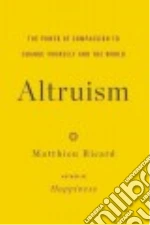 Title :
Altruism (CD Audiobook)
Title :
Altruism (CD Audiobook)Author: Ricard Matthieu, Woren Dan (NRT) Publisher: Blackstone Audio Inc € 42,50
|
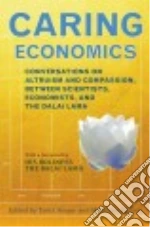 Title :
Caring Economics
Title :
Caring EconomicsAuthor: Singer Tania (EDT), Ricard Matthieu (EDT), Dalai Lama XIV (FRW) Publisher: Picador USA A COLLECTION OF INTERNATIONALLY RENOWNED SCIENTISTS AND ECONOMISTS IN DIALOGUE WITH HIS HOLINESS THE DALAI LAMA, ADDRESSING THE NEED FOR A MORE ALTRUISTIC ECONOMY Can the hyperambitious, bottom-line-driven practices of the global economy incorporate compassion into the pursuit of wealth? Or is economics driven solely by materialism and self-interest? InCaring Economics, experts consider these questions alongside the Dalai Lama in a wide-ranging, scientific-based discussion on economics and altruism. € 23,20
|
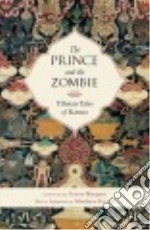 Title :
The Prince and the Zombie
Title :
The Prince and the ZombieAuthor: Wangmo Tenzin, Ricard Matthieu (FRW), Kohn Sherab Chodzin (TRN) Publisher: Shambhala Pubns A prince must capture and bring back to his country a wily zombie—but will the zombie's magical powers prove too great for the prince? These zombie stories, known as the Vetalapancavimsati in Sanskrit, are engrossing teaching tales that originated in ancient India but have become popular in the Buddhist culture of Tibet, as well as in other Asian cultures. The hero has to bring back to his country a zombie endowed with magical powers, but to succeed he must keep himself from speaking even one word to the zombie. The zombie is wily, and during the long journey he recounts fascinating tales to the prince, who is carrying him in a sack on his back. Spellbound by the stories, the prince is drawn into making some comment on them. But the very moment he opens his mouth, the zombie escapes and the prince has to go back to India to catch the zombie all over again. This same scenario occurs over and over, tale after tale, journey after journey--until the prince truly learns his lesson. This Tibetan version of the stories conveys the values of Buddhism, particularly those related to karma (the laws of cause and effect), happiness, and suffering. Through these tales, the reader learns that Buddhism is a path of knowledge that leads to liberation from suffering. € 11,60
|
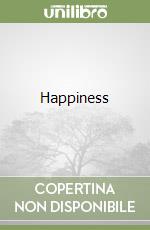 Title :
Happiness
Title :
HappinessAuthor: Matthieu Ricard Publisher: ATLANTIC BOOKS € 10,25
|
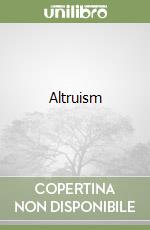 Title :
Altruism
Title :
AltruismAuthor: RICARD MATTHIEU Publisher: Time Warner ALTRUISM - RICARD MATTHIEU - Time Warner € 15,40
|
|
|
1914 |
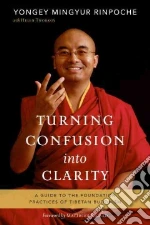 Title :
Turning Confusion into Clarity
Title :
Turning Confusion into ClarityAuthor: Rinpoche Yongey Mingyur, Tworkov Helen (CON), Ricard Matthieu (FRW) Publisher: Snow Lion Pubns Advice and encouragement from a leading spiritual teacher and popular author on how to approach the foundational practices of Tibetan Buddhism. For anyone interested in Buddhist practice and philosophy, this book gives detailed instruction and friendly and inspiring advice for those embarking on the Tibetan Buddhist path in earnest. By offering guidance on how to approach the process and giving instruction for specific meditation and contemplation techniques, Yongey Mingyur Rinpoche provides gentle yet thorough commentary, companionship, and inspiration for committing to the Buddhist path. € 22,30
|
|
|
2014 |
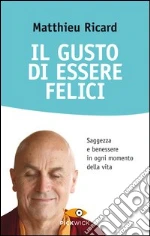 Title :
Il gusto di essere felici
Title :
Il gusto di essere feliciAuthor: Ricard Matthieu Publisher: Sperling & Kupfer Una guida pratica per migliorare la propria esistenza. Matthieu Ricard, monaco buddista occidentale, posiziona la felicità al primo posto nella classifica dei sentimenti di ognuno di noi. Come identificarla, raggiungerla e conservarla? Attraverso un percorso individuale di presa di coscienza interiore e di equilibrio della mente. La felicità è il motore dell'esistenza e rappresenta, più di ogni altro sentimento, l'amore per noi stessi e per il prossimo. Per questo motivo, imparare a conoscere i meandri della nostra mente e le tecniche che ne aiutano l'equilibrio diventano pilastri fondamentali del nostro benessere interiore che inevitabilmente terminerà con influenzare positivamente tutto il corso della nostra vita. Attraverso brevi e concise analisi, l'autore mette a confronto filosofia e quotidianità, fornendo così una rappresentazione completa e dinamica della sfera emotiva umana. € 9,90
|
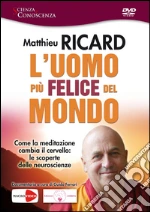 Title :
L'uomo più felice del mondo. DVD
Title :
L'uomo più felice del mondo. DVDAuthor: Ricard Matthieu; Ferrari Guido Publisher: Macrovideo L'uomo più felice del mondo: così è chiamato Matthieu Ricard (ex-biologo dell'Istituto Pasteur e monaco buddhista) dai suoi colleghi scienziati che, studiandone il cervello, hanno constatato che 30 anni di meditazione hanno atrofizzato le aree preposte alla depressione rendendo molto più attive del normale quelle del benessere. 'Meditare - spiega Ricard - è mirare a uno stato di lucidità, compassione e pace interiore immenso da cui affrontare le difficoltà; pensiero, parola e azione sono allora sempre adeguati, e perciò fonte di bene per sé e per gli altri, invece che di stress'. Abbiamo ora la prova scientifica che il training meditativo può stabilizzarci nella felicità. Nel Dvd, l'esperienza e la saggezza di un monaco buddista, biologo, filosofo, e scrittore. Un video con la presenza di un grande maestro che con semplicità ti aiuterà a mettere in atto i cambiamenti per cambiare e ti donerà i benefici di un training meditativo quotidiano. € 17,50
|
|
1914 |
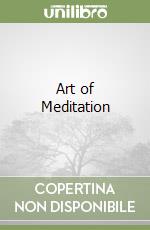 Title :
Art of Meditation
Title :
Art of MeditationAuthor: Matthieu Ricard Publisher: ATLANTIC BOOKS € 11,90
|
|
|
1913 |
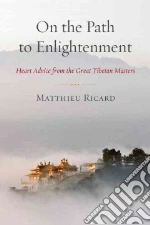 Title :
On the Path to Enlightenment
Title :
On the Path to EnlightenmentAuthor: Ricard Matthieu Publisher: Shambhala Pubns Dilgo Khyentse Rinpoche inspired Matthieu Ricard to create this anthology by telling him that “when we come to appreciate the depth of the view of the eight great traditions [of Tibetan Buddhism] and also see that they all lead to the same goal without contradicting each other, we think, ‘Only ignorance can lead us to adopt a sectarian view.’” Ricard has selected and translated some of the most profound and inspiring teachings from across these traditions. The selected teachings are taken from the sources of the traditions, including the Buddha himself, Nagarjuna, Guru Rinpoche, Atisha, Shantideva, and Asanga; from great masters of the past, including Thogme Zangpo, the Fifth Dalai Lama, Milarepa, Longchenpa, and Sakya Pandita; and from contemporary masters, including the Fourteenth Dalai Lama and Mingyur Rinpoche. They address such topics as the nature of the mind; the foundations of taking refuge, generating altruistic compassion, acquiring merit, and following a teacher; view, meditation, and action; and how to remove obstacles and make progress on the path. € 17,60
|
|
|
2013 |
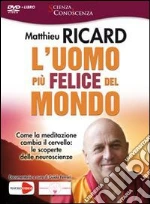 Title :
L'uomo più felice del mondo. Come la meditazione cambia il cervello: le scoperte delle neuroscienze. DVD. Con libro
Title :
L'uomo più felice del mondo. Come la meditazione cambia il cervello: le scoperte delle neuroscienze. DVD. Con libroAuthor: Ricard Matthieu; Ferrari Guido Publisher: Macrovideo L'uomo più felice del mondo: così è chiamato Matthieu Ricard (ex-biologo dell'Istituto Pasteur e monaco buddhista) dai suoi colleghi scienziati che, studiandone il cervello, hanno constatato che 30 anni di meditazione hanno atrofizzato le aree preposte alla depressione rendendo molto più attive del normale quelle del benessere. 'Meditare - spiega Ricard - è mirare a uno stato di lucidità, compassione e pace interiore immenso da cui affrontare le difficoltà; pensiero, parola e azione sono allora sempre adeguati, e perciò fonte di bene per sé e per gli altri, invece che di stress'. Abbiamo ora la prova scientifica che il training meditativo può stabilizzarci nella felicità. € 14,50
|
|
|
1912 |
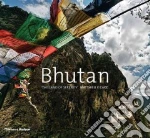 Title :
Bhutan
Title :
BhutanAuthor: Ricard Matthieu Publisher: THAMES & HUDSON Tucked away between China and India in the heart of the Himalayas,Bhutan remains a uniquely distinct country. Few photographers havebeen granted permission to reside in this long-inaccessible kingdom,now a democracy, where life quietly unfolds to the rhythm of traditionsamid the magnificent, unspoiled landscape.Matthieu Ricard, a monk and photographer, spent eight years inBhutan with Dilgo Khyentse Rinpoche, a revered Tibetan Buddhistmaster, and has continued to return to the “land of the thunderdragon” throughout his life, discovering on each occasion anotherof its invaluable treasures. His experiences are recorded here inthis exceptionally beautiful book, a voyage to the heart of Bhutan,a land where spirituality and daily life are intimately linked. € 15,50
|
 Title :
Tibet
Title :
TibetAuthor: Ricard Matthieu Publisher: Thames & Hudson Matthieu Ricard has lived in Nepal for over thirty years. Duringthis time he has forged close ties with some of Buddhism’s greatestspiritual masters, from Dilgo Khyentse Rinpoche to His Holinessthe Dalai Lama, for whom he is the official French interpreter. Ricard’s status as a monk and his knowledge of the Tibetanpeople and culture have opened many doors to him: he has beenable to follow pilgrimages made by the great lamas of easternTibet; to bear witness to the artistry of wood engravers at thegigantic, mysterious Dege printing press; and to meet hermitmonks in extremely remote regions of Kham. These experiencesand many others are recorded here in sublime color photographs. € 19,50
|
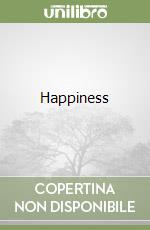 Title :
Happiness
Title :
HappinessAuthor: RicardMatthieu Publisher: CANONGATE BOOKS € 9,40
|
|
1911 |
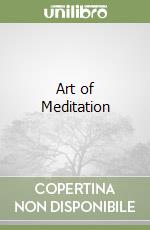 Title :
Art of Meditation
Title :
Art of MeditationAuthor: Matthieu Ricard Publisher: ATLANTIC BOOKS € 9,40
|
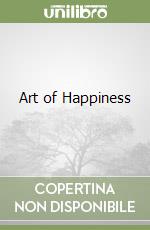 Title :
Art of Happiness
Title :
Art of HappinessAuthor: Matthieu Ricard Publisher: ATLANTIC BOOKS € 6,70
|
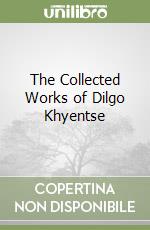 Title :
The Collected Works of Dilgo Khyentse
Title :
The Collected Works of Dilgo KhyentseAuthor: Rab-gsal-zla-ba Dis-mgo Mkhyen-brtse, Ricard Matthieu (EDT), Kurz Vivian (EDT) Publisher: Shambhala Pubns € 69,10
|
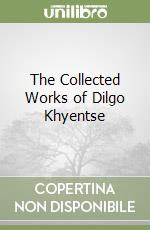 Title :
The Collected Works of Dilgo Khyentse
Title :
The Collected Works of Dilgo KhyentseAuthor: Rab-gsal-zla-ba Dis-mgo Mkhyen-brtse, Ricard Matthieu (EDT), Kurz Vivian (EDT) Publisher: Shambhala Pubns € 82,50
|
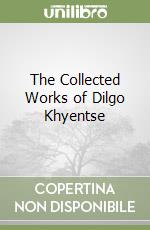 Title :
The Collected Works of Dilgo Khyentse
Title :
The Collected Works of Dilgo KhyentseAuthor: Rab-gsal-zla-ba Dis-mgo Mkhyen-brtse, Ricard Matthieu (EDT), Kurz Vivian (EDT) Publisher: Shambhala Pubns € 69,10
|
|
|
1910 |
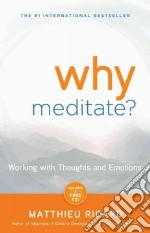 Title :
Why Meditate?
Title :
Why Meditate?Author: Ricard Matthieu, Kohn Sherab Chodzin (TRN) Publisher: Hay House Inc Why meditate? On what? And how? In his latest book Why Meditate?—an instant bestseller in the author's native France—Matthieu Ricard aims to answer these very questions. As a molecular geneticist turned Buddhist monk, Ricard brings a wholly unique perspective to the practice of meditation. Often referred to as “the happiest man in the world,” he advises us in the ways to imbue our lives with a true sense of serenity and fulfillment. In simple, clear language, Ricard walks readers through the theories and practicalities of meditation, demonstrating its many benefits in our modern world. He shows readers how to achieve emotional balance, enhance mindfulness, expand altruistic love, and develop a sense of inner calm; while also reducing anxiety, vulnerability to pain, and tendency toward depression and anger. This enlightening book conflates the spiritual with the scientific, the transcendent with the pragmatic, and the Western world with Eastern wisdom. No matter what point of view you approach it from—whether that of personal transformation or physical health—meditation emerges as a prominent part of leading a balanced life. In the accompanying 60-minute CD, Ricard explores the concepts of freedom and self, expands on the benefits of meditation, and advises on the benefits of creating a regular meditative practice.
All of the author's proceeds from the sale of this book go to Karuna-Shechen, a humanitarian organization that he founded to provide primary health care and education for the under-served populations of the Himalayan region. € 14,30
|
|
|
2009 |
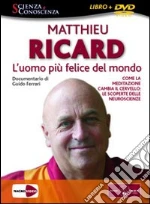 Title :
L'uomo più felice del mondo. Come la meditazione cambia il cervello: le scoperte delle neuroscienze. DVD. Con libro
Title :
L'uomo più felice del mondo. Come la meditazione cambia il cervello: le scoperte delle neuroscienze. DVD. Con libroAuthor: Ricard Matthieu Publisher: Macrovideo L'uomo più felice del mondo: così è chiamato Matthieu Ricard (ex-biologo dell'Istituto Pasteur e monaco buddhista) dai suoi colleghi scienziati che, studiandone il cervello, hanno constatato che 30 anni di meditazione hanno atrofizzato le aree preposte alla depressione rendendo molto più attive del normale quelle del benessere. «Meditare - spiega Ricard - è mirare a uno stato di lucidità, compassione e pace interiore immenso da cui affrontare le difficoltà; pensiero, parola e azione sono allora sempre adeguati, e perciò fonte di bene per sé e per gli altri, invece che di stress». Abbiamo ora la prova scientifica che il training meditativo può stabilizzarci nella felicità. € 18,50
|
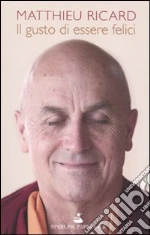 Title :
Il Gusto di essere felici
Title :
Il Gusto di essere feliciAuthor: Ricard Matthieu Publisher: Sperling & Kupfer Una guida pratica per migliorare la propria esistenza. Matthieu Ricard, monaco buddista occidentale, posiziona la felicità al primo posto nella classifica dei sentimenti di ognuno di noi. Come identificarla, raggiungerla e conservarla? Attraverso un percorso individuale di presa di coscienza interiore e di equilibrio della mente. La felicità è il motore dell'esistenza e rappresenta, più di ogni altro sentimento, l'amore per noi stessi e per il prossimo. Per questo motivo, imparare a conoscere i meandri della nostra mente e le tecniche che ne aiutano l'equilibrio diventano pilastri fondamentali del nostro benessere interiore che inevitabilmente terminerà con influenzare positivamente tutto il corso della nostra vita. Attraverso brevi e concise analisi, l'autore mette a confronto filosofia e quotidianità, fornendo così una rappresentazione completa e dinamica della sfera emotiva umana. € 10,50
|
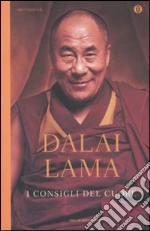 Title :
I consigli del cuore
Title :
I consigli del cuoreAuthor: Gyatso Tenzin (Dalai Lama); Ricard Matthieu Publisher: Mondadori Nella tradizione tibetana i 'Consigli del cuore' sono gli ammonimenti che i grandi maestri davano a chi si recava a consultarli. Un'usanza che il Dalai Lama ha voluto riprendere, offrendo in queste pagine una serie di brevi riflessioni destinate ad accompagnare il lettore nel corso di tutta la vita, indipendentemente dalle sue credenze religiose. Rivolgendosi con compassione a ogni uomo e a ogni donna secondo la sua età, il suo stato d'animo, la sua particolare situazione e il suo ruolo nella società, Sua Santità illustra un pensiero di grande profondità, sintetizzando in parole semplici le scelte fondamentali nella vita di ciascuno. Il messaggio di questo grande uomo, infaticabile pellegrino della pace nel mondo, diventa così una piccola guida spirituale da tenere sempre accanto: per assorbirne la serenità e la saggezza, per trovare a ogni domanda una risposta luminosa e consolatrice. € 9,50
|
|
2008 |
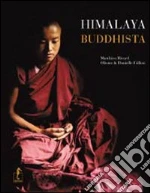 Title :
Himalaya buddhista. Ediz. illustrata
Title :
Himalaya buddhista. Ediz. illustrataAuthor: Föllmi Danielle; Föllmi Olivier; Ricard Matthieu Publisher: L'Ippocampo € 25,00
|
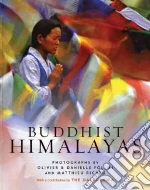 Title :
Buddhist Himalayas
Title :
Buddhist HimalayasAuthor: Follmi Olivier (PHT), Follmi Danielle (PHT), Ricard Matthieu (PHT), Dalai Lama XIV (CON) Publisher: Harry N Abrams Inc This spectacular book invites the reader on a journey to a faraway exotic land and into an inner realm of spirituality. Photographers Olivier and Danielle Föllmi and Matthieu Ricard have dedicated more than twenty-five years to capturing the essence of Buddhism and the Himalayan spirit, focusing on the beauty of the majestic Tibetan countryside, the Tibetan people?spiritual masters and humble shepherds alike?and their sacred places.
This harmonious visual mosaic of the unrivaled richness of this mountaintop civilization is enhanced by texts by eminent specialists on Tibetan culture as well as reflections from political and spiritual leaders of the Himalayan world. Offering a perspective from both within and outside Tibetan society, each of the twenty-one authors?from the noted photographer Galen Rowell to the Dalai Lama himself?provides a window onto the Buddhist Himalayas and the people who inhabit this magical land. € 25,20
|
|
2007 |
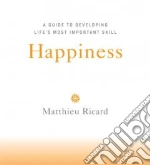 Title :
Happiness (CD Audiobook)
Title :
Happiness (CD Audiobook)Author: Ricard Matthieu Publisher: Sounds True What is the one thing everyone wants? Happiness. But where do we find it? French Buddhist monk Matthieu Ricard has been working with scientists and Buddhist scholars to explore the effects of meditation on the brain and its correlation with happiness. What he discovered: Happiness is not something you seek, but rather it is a skill you develop. On Happiness, the former cellular biologist merges the newest scientific research with traditional Buddhist teachings and contemporary Western philosophy to show you the keys to realizing the experience of happiness. Join Ricard on this audio adaptation of his book of the same title to learn more about: - How to cultivate sukha-a balanced state of well-being that arises when we release ourselves from mental blindness and afflictive emotions - Practices for working with your mind to develop attention, focus, and clarity-a foundation for inner peace - How to work with the ego and time to enter the state of flow € 17,20
|
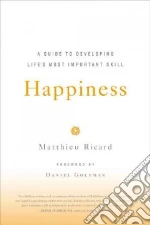 Title :
Happiness
Title :
HappinessAuthor: Ricard Matthieu, Browner Jesse (TRN) Publisher: Little Brown & Co A molecular biologist turned Buddhist monk draws on both Eastern and Western teachings to offer insight into how to develop one's internal self for true happiness, in a guide that covers such topics as the fundamental pursuit of a meaningful life, developing new patterns of interaction with the outside world, and meditation. Reprint. € 15,20
|
|
2006 |
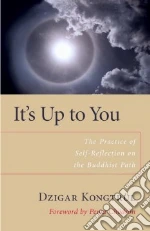 Title :
It's Up to You
Title :
It's Up to YouAuthor: Kongtrul Dzigar, Chodron Pema (FRW), Ricard Matthieu (CON) Publisher: Shambhala Pubns On the spiritual path we speak of enlightenment. But how do we reconcile the idea of enlightenment with what we see when we look in the mirror—when insecurities, doubts, and self-centered tendencies arise in our minds? Dzigar Kongtrül suggests that we need not feel “doomed” when these experiences surface. In fact, such experiences are not a problem if we are able to simply let them arise without judging them or investing them with so much meaning. This approach to experience is what Kongtrül calls self-reflection. Self-reflection is a practice, a path, and an attitude. It is the spirit of taking an interest in that which we usually try to push away. When we practice self-reflection we take liberation into our own hands and accept the challenge and personal empowerment in Kongtrül's title: it's up to you. € 17,00
|
|
|
2004 |
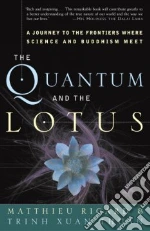 Title :
The Quantum And The Lotus
Title :
The Quantum And The LotusAuthor: Ricard Matthieu, Thuan Trinh Xuan Publisher: Broadway Books Matthieu Ricard trained as a molecular biologist, working in the lab of a Nobel prize—winning scientist, but when he read some Buddhist philosophy, he became drawn to Buddhism. Eventually he left his life in science to study with Tibetan teachers, and he is now a Buddhist monk and translator for the Dalai Lama, living in the Shechen monastery near Kathmandu in Nepal. Trinh Thuan was born into a Buddhist family in Vietnam but became intrigued by the explosion of discoveries in astronomy during the 1960s. He made his way to the prestigious California Institute of Technology to study with some of the biggest names in the field and is now an acclaimed astrophysicist and specialist on how the galaxies formed. When Matthieu Ricard and Trinh Thuan met at an academic conference in the summer of 1997, they began discussing the many remarkable connections between the teachings of Buddhism and the findings of recent science. That conversation grew into an astonishing correspondence exploring a series of fascinating questions. Did the universe have a beginning? Or is our universe one in a series of infinite universes with no end and no beginning? Is the concept of a beginning of time fundamentally flawed? Might our perception of time in fact be an illusion, a phenomenon created in our brains that has no ultimate reality? Is the stunning fine-tuning of the universe, which has produced just the right conditions for life to evolve, a sign that a “principle of creation” is at work in our world? If such a principle of creation undergirds the workings of the universe, what does that tell us about whether or not there is a divine Creator? How does the radical interpretation of reality offered by quantum physics conform to and yet differ from the Buddhist conception of reality? What is consciousness and how did it evolve? Can consciousness exist apart from a brain generating it? The stimulating journey of discovery the authors traveled in their discussions is re-created beautifully in The Quantum and the Lotus, written in the style of a lively dialogue between friends. Both the fundamental teachings of Buddhism and the discoveries of contemporary science are introduced with great clarity, and the reader will be profoundly impressed by the many correspondences between the two streams of thought and revelation. Through the course of their dialogue, the authors reach a remarkable meeting of minds, ultimately offering a vital new understanding of the many ways in which science and Buddhism confirm and complement each other and of the ways in which, as Matthieu Ricard writes, “knowledge of our spirits and knowledge of the world are mutually enlightening and empowering.” “The Quantum and the Lotus is a mind-expanding, eye-opening exploration of the exciting parallels between cutting-edge thinking in physics and Buddhism–a scintillating conversation any thinking person would delight in overhearing.” —Daniel Goleman, author of Emotional Intelligence “The Quantum and the Lotus is the rich and inspiring result of a deeply interesting dialogue between Western science and Buddhist philosophy. This remarkable book will contribute greatly to a better understanding of the true nature of our world and the way we live our lives.” —His Holiness the Dalai Lama € 15,20
|
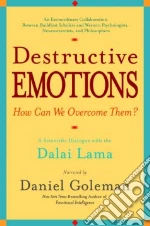 Title :
Destructive Emotions
Title :
Destructive EmotionsAuthor: Goleman Daniel, Davidson Richard J. (CON), Ekman Paul (CON), Greenberg Mark (CON), Flanagan Owen (CON), Ricard Matthieu (CON) Publisher: Bantam Dell Pub Group *Why do seemingly rational, intelligent people commit acts of cruelty and violence? *What are the root causes of destructive behavior? *How can we control the emotions that drive these impulses? *Can we learn to live at peace with ourselves and others? Imagine sitting with the Dalai Lama in his private meeting room with a small group of world-class scientists and philosophers. The talk is lively and fascinating as these leading minds grapple with age-old questions of compelling contemporary urgency. Daniel Goleman, the internationally bestselling author of Emotional Intelligence, provides the illuminating commentary—and reports on the breakthrough research this historic gathering inspired. Destructive Emotions Buddhist philosophy tells us that all personal unhappiness and interpersonal conflict lie in the “three poisons”: craving, anger, and delusion. It also provides antidotes of astonishing psychological sophistication--which are now being confirmed by modern neuroscience. With new high-tech devices, scientists can peer inside the brain centers that calm the inner storms of rage and fear. They also can demonstrate that awareness-training strategies such as meditation strengthen emotional stability—and greatly enhance our positive moods. The distinguished panel members report these recent findings and debate an exhilarating range of other topics: What role do destructive emotions play in human evolution? Are they “hardwired” in our bodies? Are they universal, or does culture determine how we feel? How can we nurture the compassion that is also our birthright? We learn how practices that reduce negativity have also been shown to bolster the immune system. Here, too, is an enlightened proposal for a school-based program of social and emotional learning that can help our children increase self-awareness, manage their anger, and become more empathetic. Throughout, these provocative ideas are brought to life by the play of personalities, by the Dalai Lama’s probing questions, and by his surprising sense of humor. Although there are no easy answers, the dialogues, which are part of a series sponsored by the Mind and Life Institute, chart an ultimately hopeful course. They are sure to spark discussion among educators, religious and political leaders, parents—and all people who seek peace for themselves and the world. The Mind and Life Institute sponsors cross-cultural dialogues that bring together the Dalai Lama and other Buddhist scholars with Western scientists and philosophers. Mind and Life VIII, on which this book is based, took place in Dharamsala, India, in March 2000. € 20,40
|

|

|

|

|